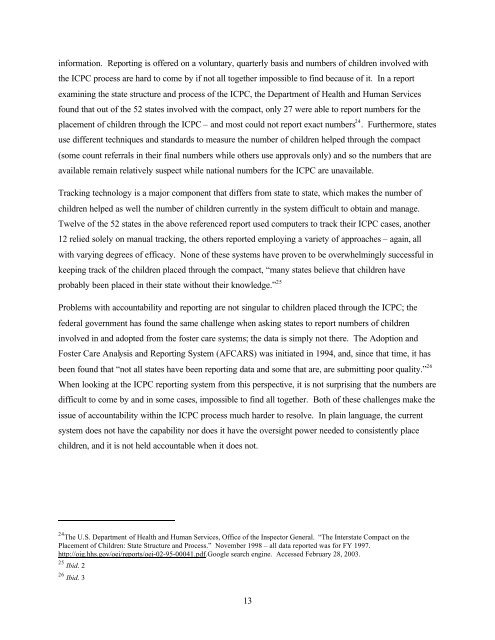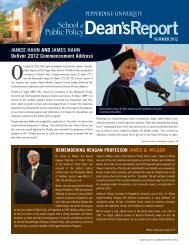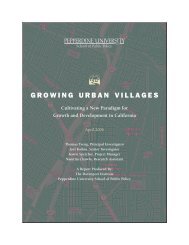Finding Permanent Homes for Adoptable Children - Pepperdine ...
Finding Permanent Homes for Adoptable Children - Pepperdine ...
Finding Permanent Homes for Adoptable Children - Pepperdine ...
Create successful ePaper yourself
Turn your PDF publications into a flip-book with our unique Google optimized e-Paper software.
in<strong>for</strong>mation. Reporting is offered on a voluntary, quarterly basis and numbers of children involved with<br />
the ICPC process are hard to come by if not all together impossible to find because of it. In a report<br />
examining the state structure and process of the ICPC, the Department of Health and Human Services<br />
found that out of the 52 states involved with the compact, only 27 were able to report numbers <strong>for</strong> the<br />
placement of children through the ICPC – and most could not report exact numbers 24 . Furthermore, states<br />
use different techniques and standards to measure the number of children helped through the compact<br />
(some count referrals in their final numbers while others use approvals only) and so the numbers that are<br />
available remain relatively suspect while national numbers <strong>for</strong> the ICPC are unavailable.<br />
Tracking technology is a major component that differs from state to state, which makes the number of<br />
children helped as well the number of children currently in the system difficult to obtain and manage.<br />
Twelve of the 52 states in the above referenced report used computers to track their ICPC cases, another<br />
12 relied solely on manual tracking, the others reported employing a variety of approaches – again, all<br />
with varying degrees of efficacy. None of these systems have proven to be overwhelmingly successful in<br />
keeping track of the children placed through the compact, “many states believe that children have<br />
probably been placed in their state without their knowledge.” 25<br />
Problems with accountability and reporting are not singular to children placed through the ICPC; the<br />
federal government has found the same challenge when asking states to report numbers of children<br />
involved in and adopted from the foster care systems; the data is simply not there. The Adoption and<br />
Foster Care Analysis and Reporting System (AFCARS) was initiated in 1994, and, since that time, it has<br />
been found that “not all states have been reporting data and some that are, are submitting poor quality.” 26<br />
When looking at the ICPC reporting system from this perspective, it is not surprising that the numbers are<br />
difficult to come by and in some cases, impossible to find all together. Both of these challenges make the<br />
issue of accountability within the ICPC process much harder to resolve. In plain language, the current<br />
system does not have the capability nor does it have the oversight power needed to consistently place<br />
children, and it is not held accountable when it does not.<br />
24 The U.S. Department of Health and Human Services, Office of the Inspector General. “The Interstate Compact on the<br />
Placement of <strong>Children</strong>: State Structure and Process.” November 1998 – all data reported was <strong>for</strong> FY 1997.<br />
http://oig.hhs.gov/oei/reports/oei-02-95-00041.pdf.Google search engine. Accessed February 28, 2003.<br />
25 Ibid. 2<br />
26 Ibid. 3<br />
13












